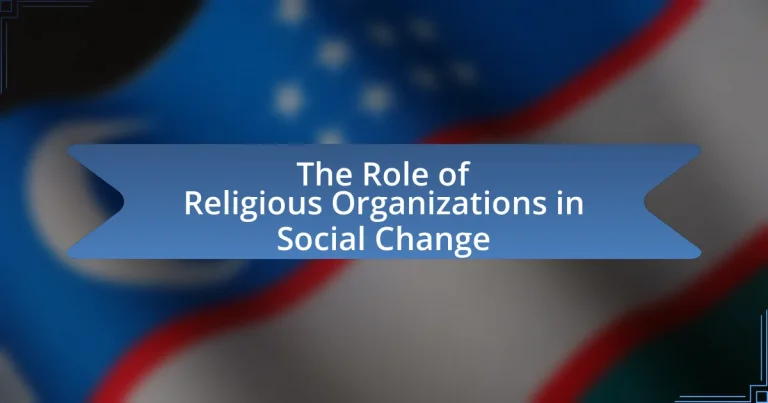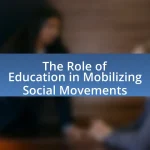Religious organizations play a crucial role in social change by mobilizing communities, advocating for social justice, and providing essential services. They influence public policy and societal norms through moral authority and community engagement, as evidenced by their involvement in historical movements like the Civil Rights Movement. These organizations address various social issues, including poverty, education, and healthcare, through initiatives that promote community development and social equity. Additionally, the article explores the mechanisms through which religious organizations operate, the impact of beliefs and values on their actions, and the challenges they face in promoting social change.
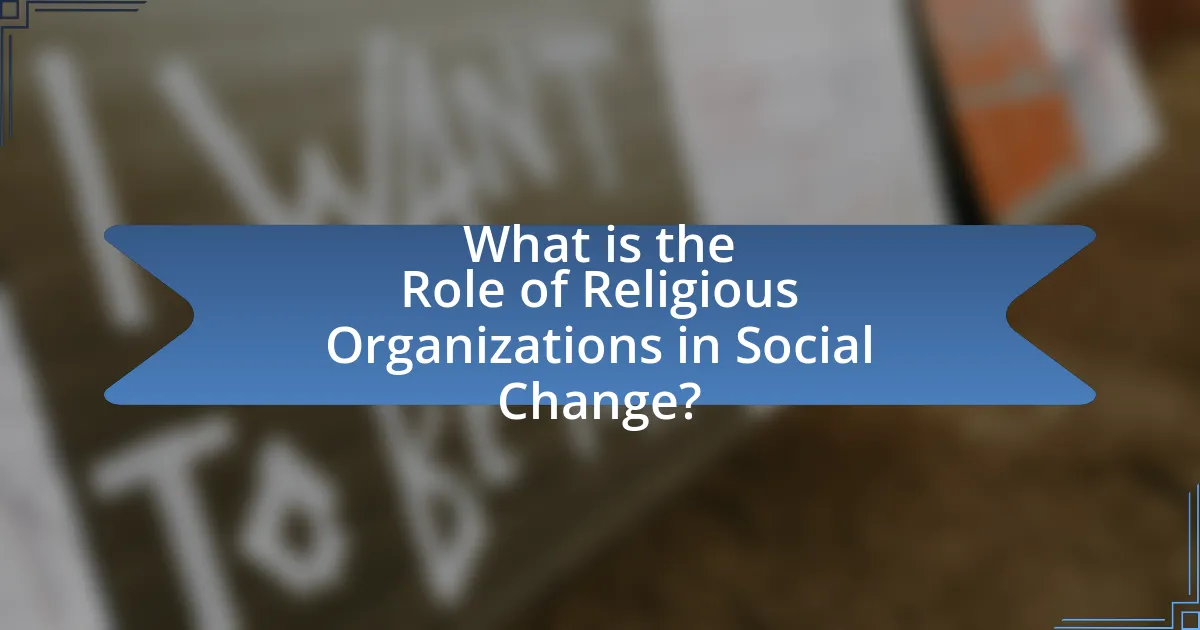
What is the Role of Religious Organizations in Social Change?
Religious organizations play a significant role in social change by mobilizing communities, advocating for social justice, and providing essential services. These organizations often serve as platforms for collective action, influencing public policy and societal norms through their moral authority and community engagement. For instance, during the Civil Rights Movement in the United States, churches were pivotal in organizing protests and advocating for racial equality, demonstrating their capacity to effect change. Additionally, religious groups frequently address social issues such as poverty, education, and healthcare, exemplified by initiatives like Habitat for Humanity, which combines faith-based motivation with community service to improve living conditions.
How do religious organizations influence social change?
Religious organizations influence social change by mobilizing communities around shared values and beliefs, often advocating for social justice, humanitarian efforts, and ethical reforms. For instance, during the Civil Rights Movement in the United States, churches played a pivotal role by providing leadership and a moral framework that galvanized public support for racial equality. Additionally, religious groups often engage in charitable activities, such as providing food, shelter, and education, which can lead to systemic changes in social welfare policies. Research indicates that faith-based organizations contribute significantly to community development and social cohesion, as evidenced by their involvement in initiatives like the United Nations’ Sustainable Development Goals, where religious entities collaborate to address poverty and inequality.
What are the key mechanisms through which religious organizations operate?
Religious organizations operate primarily through community building, moral guidance, and social services. Community building fosters a sense of belonging and identity among members, which strengthens social ties and encourages collective action. Moral guidance provides ethical frameworks that influence individual and societal behavior, often leading to social change initiatives. Social services, such as charity work and advocacy, address social issues and support marginalized populations, demonstrating the organization’s commitment to social justice. For instance, many religious organizations engage in humanitarian efforts, such as food banks and shelters, which directly impact community welfare and promote social equity.
How do beliefs and values shape the actions of religious organizations?
Beliefs and values fundamentally shape the actions of religious organizations by guiding their mission, community engagement, and social advocacy. For instance, a religious organization that values compassion and service may actively participate in charitable activities, such as feeding the homeless or providing disaster relief, reflecting its core belief in helping those in need. This is evident in organizations like Catholic Charities, which operates under the belief of serving the marginalized, providing over 10 million meals annually in the United States alone. Additionally, beliefs about social justice can drive religious organizations to advocate for systemic change, as seen in the Civil Rights Movement, where faith leaders played pivotal roles in promoting equality based on their values of justice and human dignity. Thus, the interplay of beliefs and values directly influences the operational priorities and social impact of religious organizations.
Why are religious organizations important in social movements?
Religious organizations are important in social movements because they provide moral authority, community support, and mobilization resources. These organizations often frame social issues within a moral context, influencing public perception and encouraging collective action. For instance, during the Civil Rights Movement in the United States, churches served as meeting places and mobilized activists, with leaders like Martin Luther King Jr. drawing on religious teachings to advocate for justice and equality. This historical example illustrates how religious organizations can galvanize communities and lend legitimacy to social causes, thereby enhancing their impact and reach.
What historical examples illustrate the impact of religious organizations on social change?
Religious organizations have significantly influenced social change throughout history, with notable examples including the abolition of slavery and the civil rights movement in the United States. The Quakers played a crucial role in the abolitionist movement, advocating against slavery in the 18th and 19th centuries, which contributed to the eventual passage of the 13th Amendment in 1865 that abolished slavery. Similarly, during the civil rights movement, leaders like Martin Luther King Jr., a Baptist minister, utilized religious teachings to mobilize communities and advocate for racial equality, culminating in landmark legislation such as the Civil Rights Act of 1964. These instances demonstrate how religious organizations have been pivotal in shaping social justice and reform movements.
How do religious organizations mobilize communities for social action?
Religious organizations mobilize communities for social action by leveraging their networks, values, and resources to inspire collective efforts. They often utilize sermons, community gatherings, and outreach programs to raise awareness about social issues, encouraging members to participate in initiatives such as food drives, advocacy campaigns, and volunteer work. For instance, the Catholic Church’s “Catholic Charities” program has mobilized millions of volunteers to address poverty and homelessness, demonstrating the effectiveness of faith-based initiatives in driving social change. Additionally, studies show that religious groups often have higher levels of community trust, which facilitates collaboration and engagement in social action efforts.
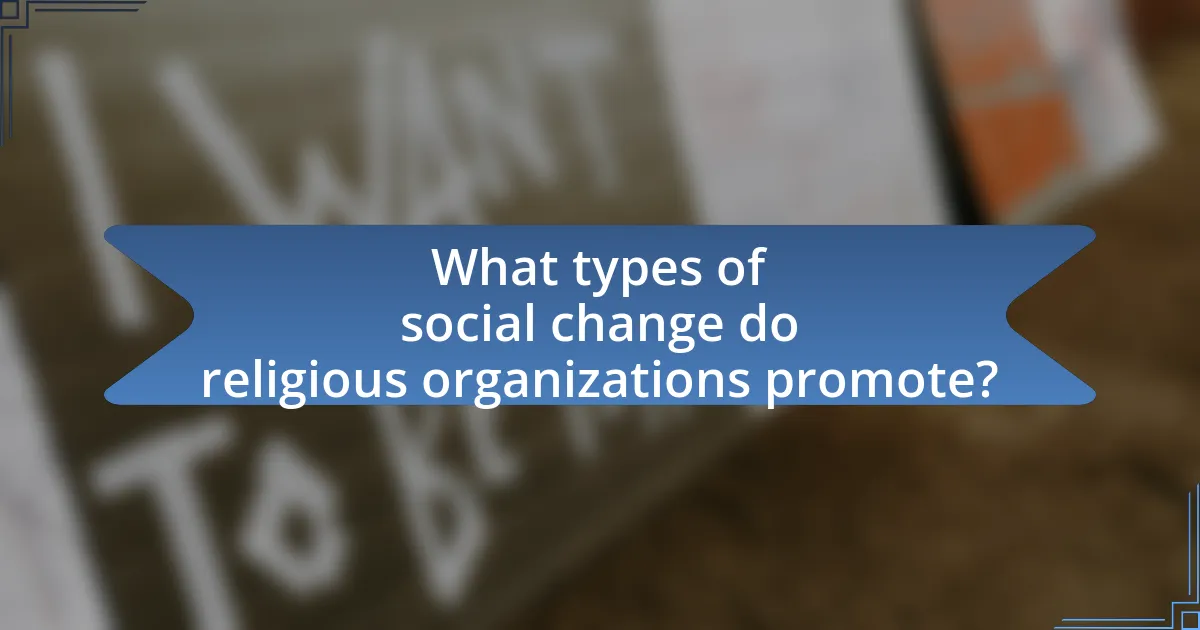
What types of social change do religious organizations promote?
Religious organizations promote various types of social change, including social justice, community development, and moral reform. These organizations often advocate for the rights of marginalized groups, such as the poor and minorities, by engaging in activism and providing support services. For instance, many religious groups participate in initiatives aimed at reducing poverty, promoting education, and addressing issues like racial inequality and gender discrimination. According to a study by the Pew Research Center, 55% of religious organizations in the United States engage in social service activities, demonstrating their active role in fostering positive societal transformations.
How do religious organizations address social justice issues?
Religious organizations address social justice issues by advocating for marginalized communities, promoting ethical teachings, and engaging in direct service. For instance, many faith-based groups actively participate in campaigns for civil rights, poverty alleviation, and environmental justice, reflecting their commitment to social equity. Organizations like the Catholic Charities and the American Jewish World Service provide humanitarian aid and support legislative changes that align with their moral values. Additionally, religious leaders often use their platforms to raise awareness about injustices, mobilizing congregations to take action through community organizing and outreach programs. This multifaceted approach demonstrates how religious organizations play a crucial role in fostering social change and addressing systemic inequalities.
What specific social justice initiatives are led by religious organizations?
Religious organizations lead various specific social justice initiatives, including poverty alleviation, racial equality, environmental stewardship, and advocacy for refugees and immigrants. For instance, the Catholic Church’s “Catholic Campaign for Human Development” focuses on addressing the root causes of poverty in the United States through community development and social justice programs. Additionally, the “Interfaith Power and Light” initiative mobilizes faith communities to promote renewable energy and combat climate change. These initiatives demonstrate the active role of religious organizations in fostering social change and addressing systemic injustices.
How do religious teachings inform social justice efforts?
Religious teachings inform social justice efforts by providing ethical frameworks that emphasize compassion, equality, and the inherent dignity of all individuals. For instance, many religious texts advocate for the care of the marginalized, as seen in the Christian principle of loving one’s neighbor and the Islamic concept of Zakat, which mandates charitable giving to support the less fortunate. These teachings inspire followers to engage in activism and community service, promoting initiatives that address poverty, discrimination, and human rights violations. Historical examples include the Civil Rights Movement in the United States, where leaders like Martin Luther King Jr. drew upon biblical principles to advocate for racial equality and justice. Such teachings not only motivate individuals but also unite communities in collective action towards social change.
In what ways do religious organizations contribute to community development?
Religious organizations contribute to community development through social services, education, and advocacy. They often provide essential services such as food banks, shelters, and healthcare, addressing immediate community needs. For instance, the Catholic Church operates numerous food pantries and homeless shelters across the United States, serving millions annually. Additionally, these organizations frequently run educational programs, including literacy and vocational training, which empower individuals and enhance community skills. Research by the Pew Research Center indicates that faith-based organizations are significant providers of social services, often filling gaps left by government programs. Furthermore, religious groups advocate for social justice and policy changes, mobilizing communities to address systemic issues like poverty and inequality, as seen in initiatives led by organizations such as the Salvation Army and Habitat for Humanity.
What programs do religious organizations implement for community support?
Religious organizations implement various programs for community support, including food banks, homeless shelters, youth mentorship, and educational initiatives. These programs aim to address immediate needs and foster long-term development within communities. For instance, according to a report by the National Council of Churches, over 70% of religious congregations in the United States engage in some form of community service, highlighting their commitment to social welfare. Additionally, many religious organizations partner with local governments and nonprofits to enhance their outreach and effectiveness, demonstrating their integral role in promoting social change and community resilience.
How do partnerships with other organizations enhance community development efforts?
Partnerships with other organizations enhance community development efforts by pooling resources, expertise, and networks to address complex social issues more effectively. For instance, collaborations between religious organizations and local nonprofits can lead to comprehensive programs that tackle poverty, education, and health disparities. Research shows that such partnerships can increase funding opportunities and improve service delivery; a study by the Stanford Social Innovation Review found that cross-sector collaborations can lead to a 25% increase in program effectiveness. This synergy allows for a more holistic approach to community challenges, ultimately fostering sustainable development.
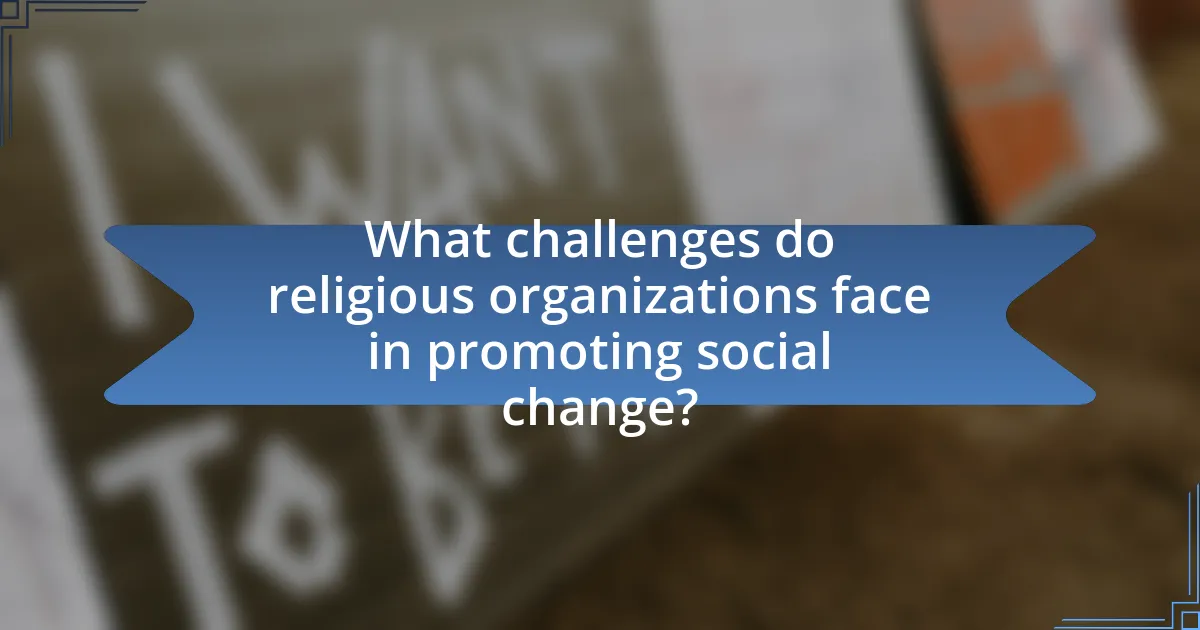
What challenges do religious organizations face in promoting social change?
Religious organizations face significant challenges in promoting social change, primarily due to internal divisions, external opposition, and the need for alignment with contemporary social issues. Internal divisions arise from differing interpretations of religious texts and doctrines, which can lead to conflicting priorities among members. For instance, a survey by the Pew Research Center found that 70% of religious groups have varying views on social issues like LGBTQ+ rights, hindering unified action.
External opposition often comes from secular entities or other religious groups that may resist changes proposed by a particular organization, creating a hostile environment for advocacy. Additionally, the need for alignment with contemporary social issues can be challenging, as many religious organizations may struggle to reconcile traditional beliefs with modern societal values, leading to a disconnect with younger generations. This disconnect is evidenced by a report from the Barna Group, which indicates that 60% of young adults feel that religious organizations are out of touch with their values.
These factors collectively impede the ability of religious organizations to effectively promote and implement social change initiatives.
How do internal conflicts affect the effectiveness of religious organizations?
Internal conflicts significantly diminish the effectiveness of religious organizations by creating divisions that hinder their ability to fulfill their missions. These conflicts often lead to a lack of cohesion among members, resulting in decreased participation in activities and initiatives aimed at social change. For instance, a study by the Pew Research Center found that organizations experiencing internal strife often struggle to mobilize resources and support for community outreach programs, which are essential for driving social change. Furthermore, internal disputes can damage the organization’s reputation, alienating potential followers and supporters, thereby limiting their influence and outreach capabilities.
What role do differing interpretations of faith play in social initiatives?
Differing interpretations of faith significantly influence social initiatives by shaping the values, priorities, and actions of religious organizations. These interpretations can lead to diverse approaches in addressing social issues, such as poverty, education, and healthcare. For instance, some faith groups may emphasize charity and direct aid, while others might focus on systemic change and advocacy for social justice. This divergence can be seen in the varying responses to issues like climate change, where some religious organizations advocate for environmental stewardship based on their beliefs, while others may prioritize economic development. Research indicates that these differing interpretations can mobilize distinct community resources and networks, ultimately affecting the effectiveness and reach of social initiatives.
How can religious organizations overcome these internal challenges?
Religious organizations can overcome internal challenges by fostering open communication and promoting inclusivity among their members. By implementing regular dialogue sessions and feedback mechanisms, these organizations can address grievances and misunderstandings, which are often sources of internal conflict. Research indicates that organizations with strong communication practices experience higher levels of member satisfaction and cohesion, as seen in studies conducted by the Pew Research Center, which highlight the importance of community engagement in faith-based groups. Additionally, providing training and resources for leadership development can empower members to take active roles in decision-making, further enhancing organizational resilience and adaptability.
What external factors impact the role of religious organizations in social change?
External factors that impact the role of religious organizations in social change include political climate, economic conditions, cultural shifts, and social movements. Political climate influences religious organizations by shaping the legal and social environment in which they operate; for example, in countries with religious freedom, organizations can advocate for social change more effectively. Economic conditions affect the resources available to these organizations, as financial stability can enhance their outreach and influence. Cultural shifts, such as changing societal values or norms, can either align with or challenge the missions of religious organizations, prompting them to adapt their approaches. Additionally, social movements can galvanize religious organizations to participate actively in advocacy and community service, as seen in the Civil Rights Movement in the United States, where many religious groups played pivotal roles in promoting social justice.
How do political climates influence the activities of religious organizations?
Political climates significantly influence the activities of religious organizations by shaping their operational environment and priorities. In authoritarian regimes, religious organizations often face restrictions that limit their ability to engage in social advocacy or community services, as seen in countries like China, where the government imposes strict regulations on religious practices. Conversely, in democratic societies, religious organizations may actively participate in social change initiatives, advocating for issues such as human rights and social justice, as evidenced by the involvement of various faith-based groups in the civil rights movement in the United States during the 1960s. These dynamics illustrate how the political context can either empower or constrain religious organizations in their efforts to effect social change.
What societal attitudes towards religion affect social change efforts?
Societal attitudes towards religion significantly influence social change efforts by shaping public perception and engagement with various social issues. For instance, when communities view religion as a positive force for social justice, they are more likely to support initiatives led by religious organizations aimed at addressing inequality, poverty, and human rights. Conversely, if religion is perceived as a source of division or intolerance, it can hinder collaboration among diverse groups and limit the effectiveness of social change efforts. Research indicates that in societies where religious leaders advocate for progressive values, such as in the case of the Civil Rights Movement in the United States, religious organizations can mobilize large segments of the population to effect change. Thus, the prevailing societal attitudes towards religion can either facilitate or obstruct the progress of social change initiatives.
What best practices can enhance the effectiveness of religious organizations in social change?
Religious organizations can enhance their effectiveness in social change by fostering community engagement, promoting interfaith collaboration, and leveraging their moral authority. Community engagement allows these organizations to understand local needs and mobilize resources effectively, as evidenced by initiatives like Habitat for Humanity, which combines faith and action to address housing issues. Interfaith collaboration broadens the impact of social initiatives by uniting diverse groups towards common goals, exemplified by the Interfaith Youth Core, which promotes cooperation among different faiths to tackle social challenges. Additionally, leveraging moral authority enables religious organizations to advocate for social justice, as seen in the Civil Rights Movement, where faith leaders played pivotal roles in promoting equality and human rights.
How can religious organizations build stronger community partnerships?
Religious organizations can build stronger community partnerships by actively engaging in collaborative initiatives that address local needs. By identifying common goals with community stakeholders, such as food security or education, these organizations can leverage their resources and networks to create impactful programs. For instance, a study by the Pew Research Center found that faith-based organizations often have established trust within communities, which can facilitate partnerships with local governments and non-profits. Additionally, hosting joint events or service projects can foster relationships and enhance visibility, leading to more robust community ties.
What strategies can religious organizations adopt to engage younger generations in social change?
Religious organizations can adopt strategies such as leveraging social media, promoting interfaith dialogue, and focusing on community service to engage younger generations in social change. By utilizing platforms like Instagram and TikTok, these organizations can reach younger audiences where they spend their time, sharing messages of social justice and community involvement. Research indicates that 69% of young people believe social media is an effective tool for social change, highlighting its potential impact. Additionally, fostering interfaith dialogue can create inclusive environments that resonate with diverse youth perspectives, encouraging participation in social initiatives. Community service projects that align with the values of younger generations, such as environmental sustainability and social equity, can also motivate their involvement, as studies show that 70% of millennials prefer to support organizations that contribute positively to society.
